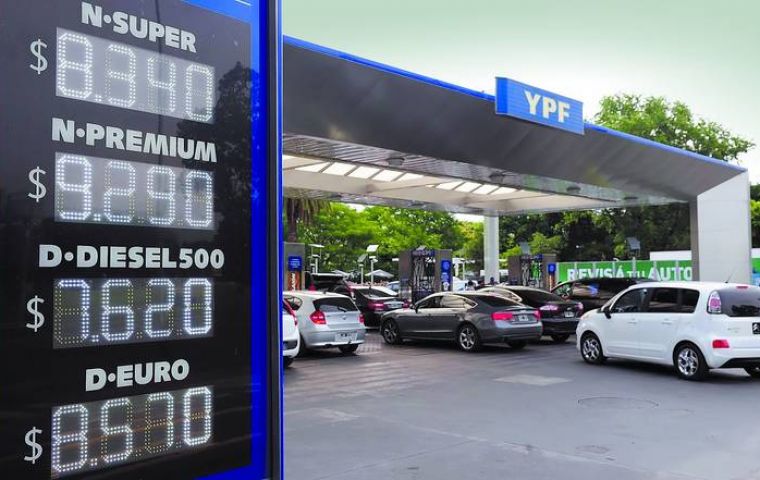MercoPress. South Atlantic News Agency
New Year in Argentina brings: hikes in urban transport and fuel and promises of a capped basket
 Fuel prices in Argentina have been steadily climbing closer to international references
Fuel prices in Argentina have been steadily climbing closer to international references New Year arrived in Argentina with much needed rainfall relief, but also with a hefty increase in urban transport fares, the same with fuel prices at the pump and the promise of a list of 200 products included in a price agreement with the county’s major supermarkets and retailers.
Rainfall helped to contain the recurrent power outages (and in some cases water shortages) that have punished almost a million consumers in the Greater Buenos Aires, (in some cases since before Christmas) because of insufficient electricity supply in the midst of an uncommon wave heat.
Authorities and the private distribution grids admitted that with temperatures over 32 Celsius, blackouts could be expected and with a long week of 38/40 Celsius average, the system in certain areas collapsed.
Consumers reacted banging pots and pans, setting fire barricades in busy corners and pickets in almost all the main highways leading to Buenos Aires. Meanwhile the government of President Cristina Fernandez blamed the distributors and threatened with ending concessions if the power supply was not resumed. However all was in vain because the distribution grid was insufficient.
Likewise on the first day of the year urban transport in the Argentine capital was upped 66%, and drivers were faced with the unpleasant surprise at the pump, since fuel prices increased across the country in two key retailers.
Shell hiked its retail prices between six and 10%, while state-owned YPF’s prices increases averaged 6.8%. The other fuel retailers like Axion, Petrobras and Oil are likely to follow suit in the short term.
Shell increased its Diesel Formula product to 8.32 pesos per liter at the tank, also increasing its Diesel V-Power to 9.97 pesos, V-Power Nitro Petrol to 10.59 pesos and Super Petrol to 9.36 pesos the liter. (All prices above one US dollar).
For its part, YPF targeted its diesel and premium fuel prices, with its premium supply in Buenos Aires City rising to 9.99 pesos the liter. It also raised Super Petrol to 8.91 pesos the liter, Diesel 500 to 8.15 pesos and Euro Diesel to 9.30 pesos the liter.
The overall Argentine demand for fuel rose 4.4% during November, which YPF converted to a 10.1% increase in sales, according to data from the Energy Secretariat. YPF’s prices have traditionally been the lowest in Argentina, but over the last year the company has taken steps to close the gap with the other retailers.
Meanwhile Argentine consumers are waiting to know which basic supermarket products will have their prices capped, with the government of President Cristina Fernandez set to release on Friday the list of around 200 products that are included in its price agreement with the county’s major supermarkets and retailers.
The list — which will be significantly smaller than last year’s 500-strong list — includes food and cleaning items that make up two-thirds of typical low-income household purchases, the government confirmed last month.
The price agreement was confirmed December 20, and was expected to be enforceable as of January 1. But on Tuesday, the spokesman for the Argentine Chamber of Supermarkets, Fernando Aguirre, revealed that the relevant parties involved in the deal were still working “product by product, company by company” to finalize the list.
The price schedule, which the government has described as a “voluntary agreement”, will now begin on January 6 in Greater Buenos Aires, before extending to other parts of the country once shipping costs have been applied to prices.
The 200-product list will likely include many of the same items as last year, such as bread, dairy products (milk, yoghurt, and cheese), beef, chicken, fruits, vegetables, juice, soft drinks and perfumery. But last year’s list was heavily criticized
Over 1,500 companies originally signed into the agreement, which was later supported by the country’s Chinese-owned supermarkets, which total more than 10,000 nationwide.




Top Comments
Disclaimer & comment rules-

-

-

Read all commentsGreetings all.... I note I appear to be first to make a comment here... Seems they must have been on holiday the last few days... My comment...
Jan 02nd, 2014 - 04:42 pm 0S.N.A.F.U. ... or more probably F.U.B.A.R.
Read the Herald and Clarin .. The country is in the pot!
Their two hopes are walking away, Brazil and China. Without private investment you don't get growth and everyone is being frightened off.
Jan 02nd, 2014 - 04:48 pm 0“FIN DEL CICLO”
Bye bye Argies, for another 10 years.
Peso is in down a lot! Pretty soon they won't be able to control it, as it goes down inflation goes up.
Jan 02nd, 2014 - 05:07 pm 0If the Soy crop is a bad as it was last year 2nd quarter 2014 will be very fun to watch.
Commenting for this story is now closed.
If you have a Facebook account, become a fan and comment on our Facebook Page!